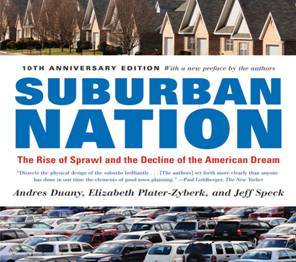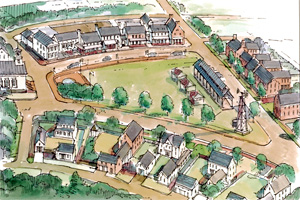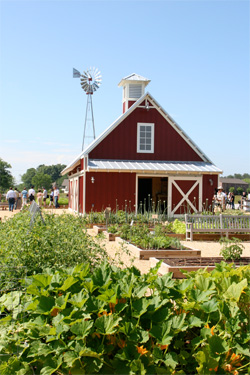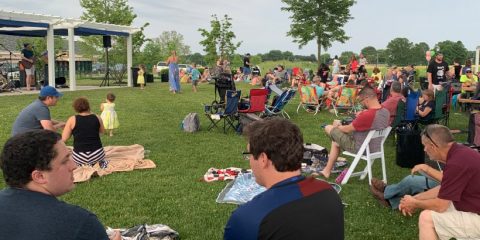Architect & Icon Andres Duany Gives Advice: Get Over It!

Architect and icon Andres Duany presented to nearly 400 businesses, students and educators at the biannual EDiS Institute in Wilmington, DE. Dubbed #EDiSInstitute2012 in social media circles, this event brought together the present and future leaders of the region’s economy to study issues facing the community for years to come. Duany did not disappoint.
Known for his thought provoking demeanor, critical eye and sense of humor, Andres Duany used this forum to reflect on his career that began in 1974, his ascendency to leader of a movement, his struggles with the economy and his vision for the future. His advice to the audience? Life is tough, so in order to lead, you had better get over it.
Making A Name
 Duany credits much of his career to the decision to enter the field of architecture. The son and grandson of builder/developers, he suggested to the audience, while offering inspiration to the students, that architecture can be the basis of any number of careers, from woodworking to building design to his field of town planning. And while he credited architecture for being the basis for his success, he made it clear to the audience that his relentless, and sometimes myopic, focus on learning the best practice of communities, has made him “a master”. Along the way he has had to sacrifice some of his “loves” such as music (he tuned out of the music world when the Rolling Stones were at the top of the charts), art (his last memory of an artist was pop art icon Jasper Jones), and food (he is grateful that he missed the entire era of Velveeta cheese). But as a perennial student and practitioner of town planning, his sheer repetition of the art helped create a career that includes towns such as Kentlands in Maryland, Seaside in Florida and Norton Commons in Kentucky. His work has also inspired The Town of Whitehall in Delaware. Along with his long resume of towns, Duany became widely published. His co-authored book Suburban Nation can be found on the bookshelf of every town planner and municipal government studying and solving the issue of sprawl. So he reemphasized, the road to mastery is difficult but fruitful, so get over it.
Duany credits much of his career to the decision to enter the field of architecture. The son and grandson of builder/developers, he suggested to the audience, while offering inspiration to the students, that architecture can be the basis of any number of careers, from woodworking to building design to his field of town planning. And while he credited architecture for being the basis for his success, he made it clear to the audience that his relentless, and sometimes myopic, focus on learning the best practice of communities, has made him “a master”. Along the way he has had to sacrifice some of his “loves” such as music (he tuned out of the music world when the Rolling Stones were at the top of the charts), art (his last memory of an artist was pop art icon Jasper Jones), and food (he is grateful that he missed the entire era of Velveeta cheese). But as a perennial student and practitioner of town planning, his sheer repetition of the art helped create a career that includes towns such as Kentlands in Maryland, Seaside in Florida and Norton Commons in Kentucky. His work has also inspired The Town of Whitehall in Delaware. Along with his long resume of towns, Duany became widely published. His co-authored book Suburban Nation can be found on the bookshelf of every town planner and municipal government studying and solving the issue of sprawl. So he reemphasized, the road to mastery is difficult but fruitful, so get over it.
Learning From Recession

Town of Whitehall, DE inspired by Andres Duany.
As the development business went, so did Duany. While he remained personally successful during the recession, his client base struggled. He attributes much of the recession to a number of factors that, when overlaid, caused catastrophic harm. Certainly he recognized that financial instruments were at the core of calamity, but he stated there was more to it. According to Duany, there was a housing bubble that was allowed to get out of control because of the notion of cheap energy. Houses were made too large, the automobile ruled the day and government investment in roads and inefficient facilities were made possible, at the expense of the homeowner. And as we climb out of the mess, he suggests that “we aren’t less wealthy”, but the infrastructure around us and our living systems (transpiration, education, governments) are built around a different type of wealth. Now that we have exhausted cheap energy, everything must change. His advice to those who want to return to the patterns of development and lifestyles in 2007…you guessed it…. get over it. We aren’t going back.
A Greener Future

Community Farm at Duany community,
Hampstead, AL.
And to the future? As all things run through architecture for Duany, all things in the future run through “green”. Duany suggested that the mindset that climate change does not exist may be perfectly valid, but the fact that there is an entire generation of leaders who embrace their environmental calling, makes the argument for status quo moot. For the naysayers, as right as they may be…. get over it. While educators, business leaders and development practioners prepare their strategies for a greener future, he insists that they’ll have to adapt because there are many faces of green. In a preview of thoughts for an upcoming book on slow urbanism, Duany suggested that there are four kinds of green thinkers: Grim Greens (they’ll push for draconian laws regardless of the cost/benefit), Cool Greens (they’ll buy anything green, but only if it is cool), Greenbacks (there had better be an ROI), and Survivalist Greens (using the green mantra as a means to business and personal survival). Regardless of where you or your client fall, the important message from Duany was to position yourself for a greener future. And for those who sway too far to the left on the environmental spectrum, Duany had some sobering words as well, “Get government out of the way”. He suggested that environmentalism is a local battle to be cured with local projects in local communities. Success will be found in communities that see urbanism as a long range plan for creating healthy residents, reconnecting with each other and make great use of the environment not for the simple sake of saving the world, but for enrichment of the inhabitants.
Looks like Andres is back!

